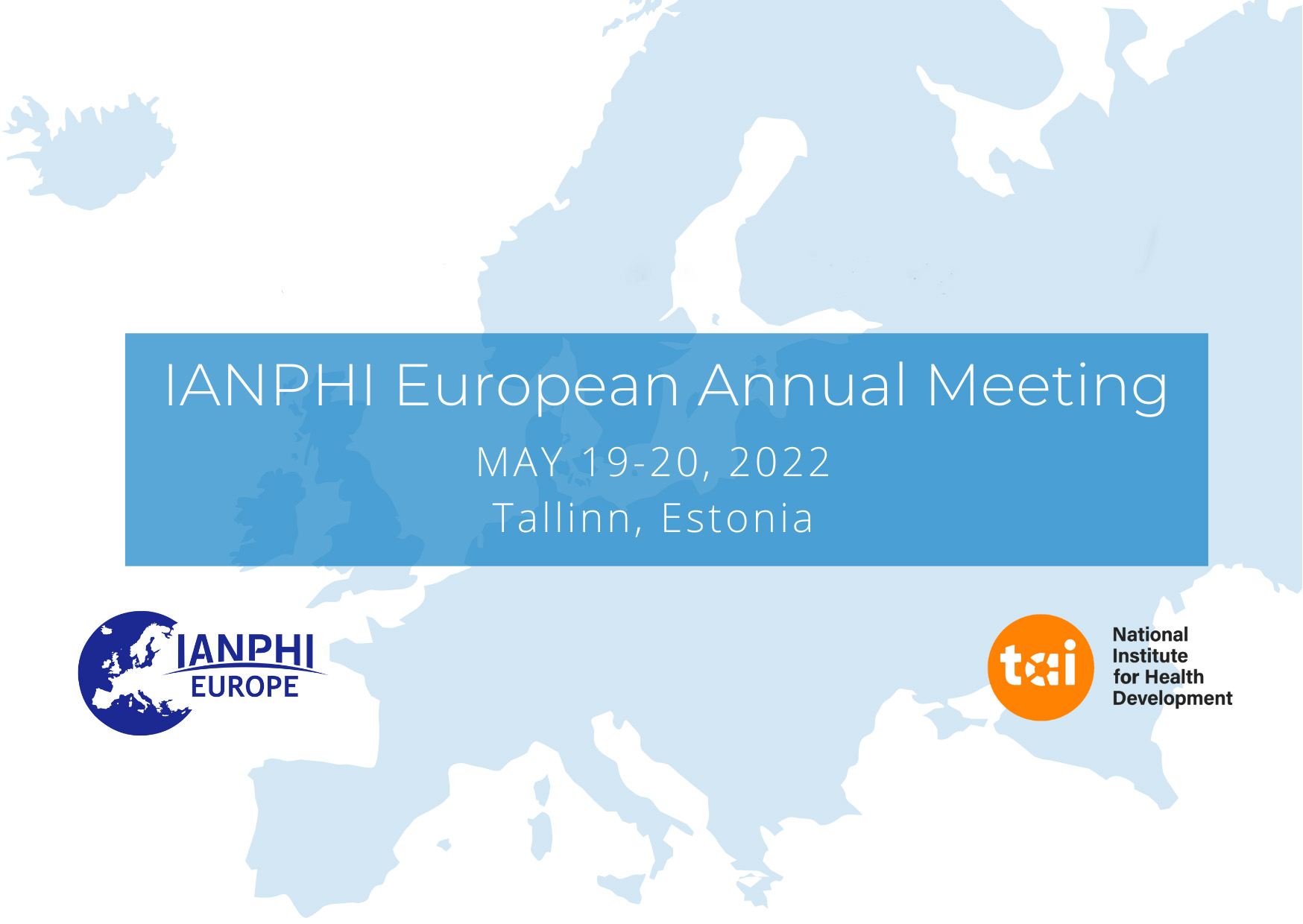2022 IANPHI Europe Meeting - Preparing for and Responding to Crises: What Role for National Public Health Institutes?

The 2022 IANPHI Europe Meeting, which bring together member institutes from the European region, took place on May 19-20, 2022 in Tallinn, Estonia, hosted by the Estonian National Institute for Health Development (Tervise Arengu Instituut, TAI). This year's theme was "Preparing for and Responding to Crises: What Role for National Public Health Institutes?" The meeting offered in-person and virtual programing with sessions on the war in Ukraine and its impacts, what COVID-19 taught NPHIs, and preparing for future crises.
The opening session featured words of welcome from Dr. Annika Veimer, director of TAI, Tanel Kiik, Estonia’s Minister of Health and Labor, Prof. Duncan Selbie, president of IANPHI, and Dr. Trygve Ottersen, chair of the IANPHI Europe Network. In a keynote speech, Dr. Gerald Rockenschaub, regional emergency director at the WHO Regional Office for Europe, spoke about the war in Ukraine as one of the biggest humanitarian crises for WHO Euro since World War II.
Dr. Ihor Kuzin, Ukraine's deputy minister of Health, described in a recorded speech the devastating impact of the war on the health of Ukrainians and on the national health system, infrastructure and workforce. The full speech is available to watch below.
Impacts of the War in Ukraine
The war in Ukraine and its impacts were discussed at length in a session that looked at the challenges faced by European NPHIs as a consequence of the war. In a presentation, Dr. Jarno Habicht, head of the WHO Country Office in Ukraine, highlighted the priorities of an NPHI during an armed conflict. Dr. Grzegorz Juszczyk, director of the National Institute of Public Health of Poland, described the steps taken by his country to process the mass influx of refugees. Dr. Fu-Meng Khaw, director of Health Protection and Screening at Public Health Wales, shared some insights about the recent IANPHI mission to Poland to study the reception of refugees. Dr. Bjorn Iversen, senior medical officer at the Norwegian Institute of Public Health, presented solutions on how NPHIs can support each other in times of conflict. The deputy director for Europe at the United Kingdom Health Security Agency, George Leahy, highlighted the importance of assessing and considering all potential hazards and strengthening collaboration between NPHIs in times of crises.
The Future of Health Threat Preparedness
Dr. Stefan Schreck, head of Health and Food Safety at the European Commission’s DG SANTE, addressed meeting participants to talk about the future of health threat preparedness. He advocated for a stronger European Health Union and a more comprehensive health security framework. Achievements can be made through a proposal for regulation on serious cross-border health threats and a high-performing epidemiological surveillance system at the EU level.
COVID-19 Lessons Learned
For two and half years, NPHIs have adapted their activities to address each phase of the COVID-19 pandemic. Moderated by Prof. Geneviève Chêne, chief executive of Santé publique France, a session looked at lessons learned from the pandemic to improve populations’ health and allow better national and international cooperation. A presentation from Prof. Hans Brug, director of the National Institute for Public Health and the Environment, called for more attention to be brought to both the direct and indirect health impacts of the pandemic. Prof. Lothar Wieler, president of the Robert Koch Institute, pointed out in his presentation that the pandemic has been very instructive in terms of communication for NPHIs, including with regards to handling pressure from decision-makers, allowing them to create general guidance for future crises. Dr. Markku Tervahauta, director of the National Institute for Health and Welfare of Finland, presented recommendations on how to improve preparedness and preparedness assessments. Dr. John Middleton, president of the Association of Schools of Public Health in the European Region, insisted on the need for a multidisciplinary public health workforce, while Prof. Silvio Brusaferro, president of the Istituto Superiore di Sanitá, highlighted the importance of mutual respect and recognition between science and politics, transparency, robust and timeless data, scientific methods and evidence, and effective and clear communication. Dr. Quentin Sandifer and Dr. Jean-Claude Desenclos concluding the session by introducing the new IANPHI Report on the Lessons Learned from NPHIs’ COVID-19 Responses.
Preparing for Future Crises
Participants in the meeting considered the transformative ways in which NPHIs might need to change to respond more effectively to future crises. Dr. Andrea Ammon, director of the European Centre for Disease Prevention and Control, pointed to the enhancement of community engagement as a considerable weakness for some NPHIs during the COVID-19 pandemic and recommended that risk communication be part of crises’ contingency plans. In her presentation, Prof. Amanda Shriwise, consultant for the WHO Office for Investment for Health and Development, highlighted how central health and equity are to the global economy. Dr. Camilla Stoltenberg, director of the Norwegian Institute of Public Health, talked about how the pandemic and the war in Ukraine brought to the front the need to nurture and better regulate the independence of NPHIs from political influence. Finally, a panel discussion discussed the legal limits of the independence of NPHIs and strategies to put health equity on the political agenda.
“Learning together is essential, and the network stands together especially in a time of multiple crises: COVID-19, child hepatitis, monkey pox, and war in Ukraine,” said Prof. Selbie, concluding the meeting.
Read the full summaries of sessions:
The war in Ukraine and its impacts
Lessons learned by NPHIs from COVID-19
Preparing for future crises and closing session
Download the full program of the event: